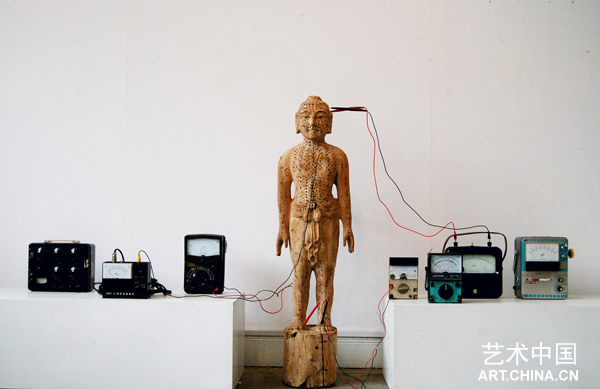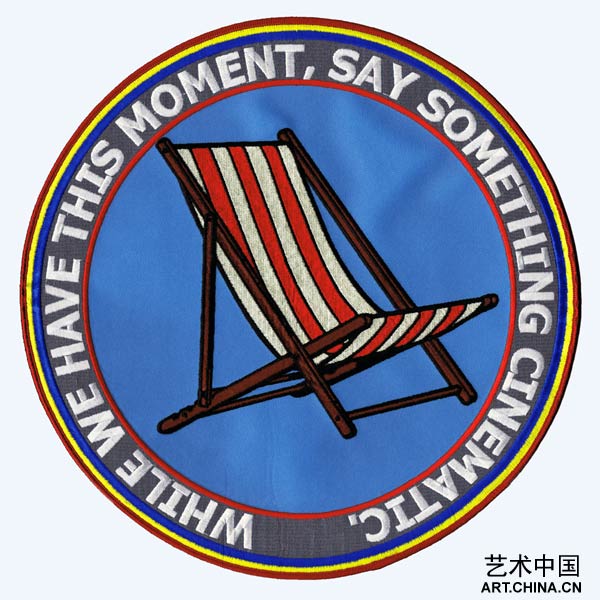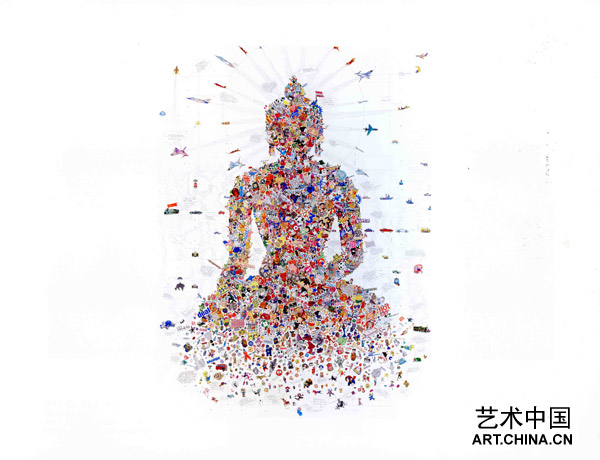| 
Tony Scott New Health Plan Installation 2007
数字艺术中国于中国艺术项目
798艺术园区
2009年6月6日至30日
开幕会: 6月6日下午4时至6时
联络人: 刘庭羽、李少青
展览地点:北京市朝阳区酒仙桥路4号798艺术区E52号
电话:010-59789096
交易的意义
中国艺术项目新作”交易的意义”-由贡嘎嘉措, 亚当 柏格兰 (英) 和 Tony Scott (澳)三位国际艺术家们携手于六月在798艺术园区的中国艺术项目画廊为您呈献
艺术家们创造了能够反映和指出所谓的”交易的”作品, 一种广告性, 产业性和专业性的行为模式。交易的行为和冷冰冰的符号大量的联结, 例如标志, 品牌行销和广告标语。大量的对物质的佔有慾和消费主义的讯息传递变成了政府和私有企业最主要的战略。
贡嘎嘉措参与了2009年威尼斯双年展和2009年在澳洲布里斯本的亚太地区当代艺术展。
贡嘎在英国生活与工作, 他的作品主要透过在伦敦的罗西和罗西画廊所经营。他对作品有极高的要求和水准, 北京的民众极其有幸能够看到这些被威尼斯双年展所肯定的艺术家的作品。
贡嘎引起了一阵讨论关于外国的态度, 价值观和行为对西藏人民所带来的冲击, 特别是深深地影响了传统的藏传佛教。
透过迷你贴纸重叠的效果以及素描所组成佛祖的形象, 藉着食物链, 时尚品牌, 娱乐产品和流行文化的题裁体现了文化之间潜移默化的关联。
亚当 柏格兰的则是以身分, 地位, 声望以极倾向英美或庸俗的广告模式去体现作品的意念。近焦的透视揭露了属于个人的, 特别意味的主题和形象性的象徵, 创造了分别使作品更具人格化的形象, 重新生产或设计出来的形象和品牌 颠覆了核心的概念。
Tony Scott一系列的新健康计画作品崇尚物品和形象, 一般而言与中药西药相关, 也指出了营销对医药试验和药品的重要性。他利用了医药的法规汇编意义作为强调死亡和长寿率的基础概念。
详细分析三位艺术家的作品, 当显而易见的记号,代码和肖像三种关係被分别的一同并置, 此三元素便颠覆了人类的思维, 也可能间接了反映出社会和政治彼此之间的交流。
热情感谢驻北京澳大利亚使馆全力的支持这次的展出。

Adam Bridgland[1] While We Have This Moment
China Art Projects at Digital Art China
798 art district
6 – 30 June 2009.
Opening 4.00 – 6.00pm: Saturday 6 June
Address:E52,No.4,Jiu Xianqiao Lu,Chao Yang District,Beijing,China
TEL:010-59789096
Trading Meaning
China Art Projects presents Trading Meaning - new work by three international artists – Gonkar Gyatso and Adam Bridgland (UK) and Tony Scott (Australia) at the DAC Gallery, 798 Art District in June.
The artists produce work which reflects on and refers to ‘trading’ – commercial, industrial and professional activity. Trade practice is inexorably linked to the use of symbols – logos, branding, slogans. The focus on mass communication, generally promoting material possessions and consumerism, is paramount to government and private enterprise strategy.
Gonkar Gyatso is participating in the 2009 Venice Biennale as well as in the 2009 Asia Pacific Triennale in Brisbane, Australia.
Gonkar lives and works in Britain and is managed by Rossi and Rossi Gallery in London. His artworks are high demand and Beijing is fortunate to have the opportunity to see an exhibition featuring this artist with works which will reflect those to be shown in Venice.
Gonkar provokes discourse on the impact of foreign attitudes, values and behaviours on the Tibetan people – in particular, the effect of these elements on the traditional Tibetan culture embedded in Buddhism.
Images of the Buddha are constructed and overlayed with mini-stickers, accompanied by pencil sketches, referencing cultural imperialism in the form of food chains, fashion brands, entertainment industry products and pop culture.
Adam Bridgland’s work is linked to the idea of identity, status, fame and advertising with a heavy leaning towards 'Englishness' or kitsch. Close inspection reveals personal, idiosyncratic text and images which take the form of badges. These in turn create a counter-point to the impersonalised, reproduced design image or ‘brand’ – subverting the intention of the code.
Tony Scott’s The New Health Plan series of works of appropriated objects and images, generally associated with Eastern and Western medicine, refer to the marketing of medical practice and products. He takes the medical codification of meaning as the conceptual basis for installations to address mortality and longevity.
In analysing the work of the three artists, the reading of recognisable symbols, codes and icons is subverted when apparent relationships are differently juxtaposed. The trading of meaning may refer to product or service transference, it might as well refer to interpretation of social or political communication.
The exhibition is generously supported through the Australian Embassy in Beijing.

Gonkar Gyatso File0234
|

